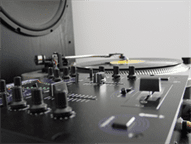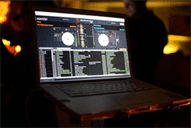The Ideal DJ Setup
Wednesday, July 29, 2015
by Tat
DJ spaces come in all different shapes and sizes, tiny box bedrooms to full on warehouse apartment rooms with comfy sofas and liberal record space. Depending on the space and equipment you have at your disposal can affect how comfortable and well you practice djing. If you are fortunate you will have a room designated as a studio come DJ booth. At the other end of the spectrum you might find yourself getting out your laptop and controller and broadcasting your mix into your headphones whilst stood at the kitchen table. This can be especially so for DJs who give up their space once a child or two appears on the scene, it's pretty common. The main thing to remember is not to give up your passion totally whatever you do. Nevertheless, regardless of your circumstances it is essential you maximise your DJ set up for comfort, ease and sound. Here are a few tips, some of which might seem obvious, but if you aren't doing them already, you should seriously consider them.
Make life comfortable for yourself
All too often DJs, especially those playing in their bedrooms can make their lives that little bit easier by making sure you optimise your setup. Like any kind of performance, and DJing is that, whether it is in your bedroom or in a stadium it is important you are comfortable. The first thing to do is make sure your setup is at a good height for you. Having your laptop, CDs or turntables at a height which means you are hunched over your decks will just result in tension or a bad back. The last thing you want to be is tense whilst you are djing, especially if you are an active, performing DJ who scratches and constantly tweaks the sound. Also, this might sound elementary, but make sure you can get to your DJ set up. If you have piles of records leaning up against your decks you might find yourself leaning over and struggling to play, again affecting your natural performing stance. Remove anything you don't need from around the area, you don't ever see chefs leaning over bowls of food to cook. If your setup is too low, then again you will find it harder to DJ, not impossible, but certainly harder. This can be especially true if you scratch, as your arm and hand position can be made more comfortable and in line with the decks by having them at the optimum height. Whilst having everything to hand is essential, so you can easily access your tracks, especially if using vinyl. If space allows it, have a box of your current playlist at turntable height to save bending down through the course of your set, it will make all the difference.
Get the sound right
Where your speakers are situated can be quite important for when you are mixing. If you have them too far away or pointing in the wrong direction you can find yourself doing all of the mixing in your headphones. Where possible, have the speakers pointing at you as if they were monitors in a club. When playing sets at home, especially by yourself, it makes sense to maximise the quality of sound for yourself. The important thing to remember is that it's not how loud you DJ, but how well, so try to get the speakers at ear height if possible. Outside the bedroom or home, DJs have monitor speakers to help them mix, the ones at home do the same job but also entertain yourself and listening friends. Obviously where you put your speakers depends on the layout of your space This is not always something easily fixed, but if you can set them either side of your decks facing you, you will be able to engage with the sounds better. Try to get the speakers off the floor and on stands, again this helps you hear the sound better. If you have a very large space then you can introduce more speakers into the equation, and have your own monitor. Whilst sound leakage can be a concern for those living close to neighbours there are things you can do. These can be from the makeshift improvements of cardboard egg trays on your walls, or by fitting thick velvet curtains and blankets on your walls. It might not look pretty, but will at least dampen some of the sound and keep it in your space. At the more costly end you could invest in having your studio, DJ space soundproofed with specialist plasterboard. It really does depend on how loud you want to play those tunes and how well you get on with your neighbours - they may actually enjoy the sounds permeating through their walls.
Know where your tunes are
Whether you are playing vinyl, CD or digital files it is important to know where each track is. That of course becomes increasingly hard to do once your collection starts to grow. Traditionally vinyl DJs were restricted to the amount of promos they were given and records they could afford. A typical bedroom DJ back in the day might have struggled to buy a dozen 12 inches every month, especially as up until the late 80s when most of the hottest tracks were imports from the U.S. These days it is easier to build a good collection of tracks to play out with - the bar has been lowered. You can find promos and re-edits on such as Soundcloud or on blogs as well as pick up the choice track from an online release using Trackhunter for a fraction of the cost of a 1980s import. Collections can grow unwieldy and cumbersome if you don't keep an eye on things, the temptation is to grab as much as you can and then sort through it later. So it's really important you start to put things into sets. Genres are a great place to build from, but some tracks cross musical boundaries, so it is important you think about whether you need a copy in two places. The same can be said for vinyl and CDs, the more you have, the more you need a filing system, otherwise you can spend more time searching for a track than playing. A thousand tracks can be easy to filter and sort, but in time it could become 10,000 or even more. Naturally digital has the advantage that you can keyword search your collection, but if you are playing a certain genre then it makes sense that you know where all of the tracks in that section are. The last thing you want to be doing is deciding you really want to play a track mid set only not to find it. Avoid that frustration and work on a good filing system.
Don't cut corners
Some DJs who have gone on to build large music collections are likely to confess it came at a price. That often being at the expense of looking after themselves, as records are better than a good meal. It can be an addictive pursuit, always in search of the next best tune you have never heard or as a completist and owning every track by one artist or label. Sometimes it can be at the expense of equipment, that being anything from a decent record bag to a pair of speakers. There are so many options available for DJs to chose from, especially when setting out. Some want set ups that can help eek out all of the functionality from such as Traktor, others prefer minimalistic approaches. If finances allow it, look to buy the best quality in everything you use, including your mixer, cables, amp and speakers, it will be well worth it. Pursuing a high quality set up will not only help you craft better mixes but it will potentially prevent issues such as upset neighbours when your creaking bass speakers start popping and leaking sound through the walls. The temptation might be to invest most of your funds into a growing music collection, but if you can afford the right interface, speakers, stands and cabling, your DJ experience will be vastly improved.
Grow your digital collection using Trackhunter






